One Piece Chapter 1162 has sent shockwaves through the fandom, officially setting up what could be the greatest and most mythic showdown in the series, Luffy versus Imu. For years, Eiichiro Oda has slowly built toward this inevitable confrontation between the “Sun God” and the shadow that rules the world.
Now, with One Piece Chapter 1162’s revelations, the stage is no longer just being set; it’s being lit ablaze. Chapter 1162 is titled “God Valley Battle Royal,” and it lives up to its name in every sense. The events of the flashback are nothing short of apocalyptic.
From Whitebeard and Rocks clashing with celestial powers to Kaido’s theft of Big Mom’s Azur Dragon Fruit, Oda uses this chapter to deepen the lore of the Void Century while quietly revealing the stakes of the current era.
The most telling scene comes when Whitebeard, after witnessing Imu’s true form, exclaims, “What in hell’s name are we facing?!” Rocks D. Xebec’s response, “The world itself!” is more than a line of dialogue. It’s a thesis statement. Imu is the world: its hidden ruler, its judge, its God.
By connecting these moments to the “Will of D” and the ancient prophecies, One Piece Chapter 1162 hints that Luffy’s true destiny isn’t just to become the Pirate King, it’s to confront and destroy the system of oppression that has ruled since the Void Century.
Imu: The world’s true enemy
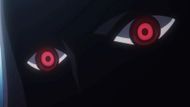
One Piece Chapter 1162 once again positions Imu as the ultimate antagonist of One Piece. The revelation that Imu can possess the bodies of others, such as Saturn and Gunko, adds an eerie dimension to their godlike influence. In Elbaf, Imu’s partial possession of Gunko already led to chaos, but this chapter suggests that such control is not limited to one body.
When Rocks, Kaido, and Whitebeard confront Imu inside Saturn’s demonic spider form, the symbolism becomes clear: this isn’t just a fight against a person. It’s a fight against the very concept of domination. Imu is both divine and parasitic, the manifestation of humanity’s will to control and erase freedom.
Oda masterfully parallels this with Luffy’s role as Nika, the Sun God of liberation. Every time Luffy frees someone, every time he breaks a chain or topples a tyrant, he’s moving closer to the day he’ll face Imu. One Piece Chapter 1162 makes it clear that the day is coming.
Rocks, Kaido, and Whitebeard vs. Imu: The echo of history in One Piece Chapter 1162
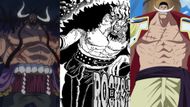
One of the most jaw-dropping sequences in One Piece Chapter 1162 features Rocks D. Xebec, Kaido in his dragon form, and Whitebeard standing together against Imu. It’s a battle that feels less like history and more like myth. This moment cements Rocks’ place as one of the strongest figures of his era and suggests that even he could not destroy Imu, only challenge them.
Rocks’ dialogue with Whitebeard captures this futility: when asked what they’re fighting, he simply says, “The world itself.” That one line connects the flashback to Luffy’s present. Rocks was the man who tried to overthrow the world through chaos. Luffy will do it through freedom.
The echoes of Rocks’ rebellion live on in the new generation, carried by Blackbeard’s ambition and Luffy’s idealism. This parallel also clarifies why the world government fears the “Will of D.” Those who inherit it are destined to stand against Imu’s order, whether they know it or not.
The prophecy comes full circle
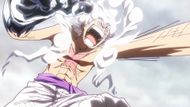
The mysterious text that appears within the chapter, referencing “the sun who laughs” and “the new morning that will arrive,” ties directly to Joy Boy’s prophecy. It confirms that the coming of the Sun God marks the end of Imu’s dominion.
For decades, fans have speculated on the meaning of these ancient inscriptions, and One Piece Chapter 1162 finally connects them to Luffy’s awakening as Nika. The “sun who laughs” can be none other than Monkey D. Luffy, the warrior of liberation who will bring dawn to a world blanketed in eternal shadow.
If Imu is “The World,” then Luffy, as Nika, represents its rebirth. The two are opposite poles of existence, order versus freedom, silence versus laughter, eternity versus renewal.
Luffy vs. Imu: The final battle of ideals
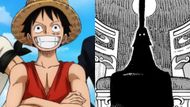
Now that the Rocks flashback has shown how even legends like Whitebeard and Kaido failed to defeat Imu, the inevitability of Luffy’s battle becomes more meaningful. It won’t just be a fight of strength but of philosophy.
Imu represents stagnation, a frozen eternity where the world government decides who lives and who vanishes. Luffy, by contrast, embodies movement and renewal. His entire character is built on the idea of forward motion: sailing beyond horizons, laughing in the face of gods, and defying destiny itself.
When they finally meet, it will not be just the clash of two powers but the culmination of the entire story of One Piece. Where Joy Boy failed to bring dawn to the world, Luffy will succeed. The “new morning” mentioned in One Piece Chapter 1162’s prophecy isn’t just a metaphor; it’s the end of the world as Imu knows it.
A future written in sunlight
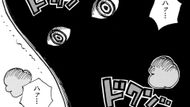
One Piece Chapter 1162 doesn’t show Luffy yet, but his presence is felt in every line of dialogue, every prophecy, and every parallel to Rocks’ rebellion. The seeds of the final battle have been sown, a confrontation between the Sun God and the false ruler of the world.
When that moment finally arrives, it won’t be a simple fight for survival or treasure. It will be the war that decides whether the world continues to live under eternal shadow or rises into the dawn promised by Joy Boy’s laughter. Luffy versus Imu is no longer a dream or a theory; it’s destiny.
